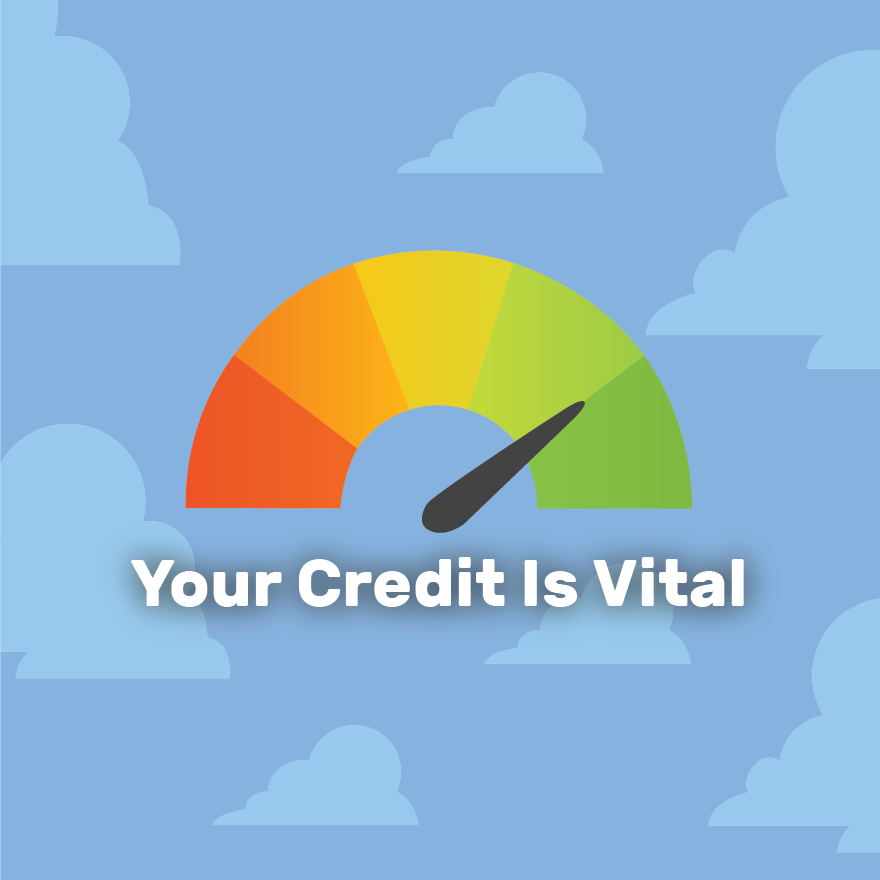
The Answers To All Your Important Questions.
Credit is the ability to borrow money or access goods or services with the understanding that you’ll pay later.
Lenders, merchants, and service providers (known collectively as creditors) grant credit based on their confidence you can be trusted to pay back what you borrowed, along with any finance charges that may apply.
To the extent that creditors consider you worthy of their trust, you are said to be creditworthy, or to have “good credit.”
What is a credit score and how is it calculated?
Your credit score reflects the information found in your credit report and is used to determine your creditworthiness. Basically, it tells lenders how likely you are to default on an obligation.
Credit scores range from 300 to 850, and the higher the score, the better. While no formal definition of a “good” credit score exists, generally, a minimum credit score of 680 is considered good. Your credit score is based on payment history, how much you owe on your accounts, credit history length, types of credit you have, and any new credit such as recently opened accounts and credit inquiries.
Credit scores are important, as everyday life can be negatively or positively impacted. Your credit score determines if you are approved for credit cards and loans and can even determine if you are billed or have to prepay your monthly utilities. They are used in almost every part of our lives, from credit cards and loan applications to employment opportunities. And those with good credit scores have access to more financial products, lower interest rates, and better terms.
Who Determines Your Credit Score?
The two main scoring models to calculate your credit score are FICO and VantageScore and lenders may look at one, or both of them when making decisions to issue a credit or approve you for loans. They gather these reports from the three major credit bureaus known as the National Credit Reporting Agencies (NRCA) and analyze the reports’ anonymous consumer data to generate an accurate scoring model.
TransUnion, Experian, and Equifax are the three major credit reporting agencies. They collect and maintain the information that makes up your credit history and your credit report. NCRAs are for-profit companies that sell this information to other companies, like lenders, insurance companies, potential employers, utility companies, and landlords. They do not share information with each other, so information that is found in one credit report may not be in another.
They collect information from your creditors, like a bank or credit card company, and public records, such as property and court records. Each NCRA gets its information from different sources. The information collected is used in your credit report. Organizations that may request your credit report include lenders from whom you are seeking credit and those who gave you credit; utility companies from whom you are requesting service; your employer or prospective employer; and banks where you want to set up an account. What is in your credit report can negatively or positively impact your credit score, which is a number that is used to determine your creditworthiness. The higher the score, the better, as you will have more access to financial products and better terms.
Where Can I Find My Credit Score?
Your credit history is summarized in files known as a credit report. A credit report is used to calculate your credit score, a numerical value assigned to an individual and calculated by looking at all aspects of a credit report – the good and the bad. A credit report provides information on your credit and the status of your credit accounts, which can include the history of on-time payments, the amount of credit you have, and overdue debt from collection agencies. All credit reports provide the same categories of information, which include:
- Personal identifying information such as your name, address, and social security number
- Tradelines, which are your credit accounts like a mortgage and car loan
- Credit inquiries that provide a 2-year history of everyone who has accessed your credit report
- Public records and collection, which can include bankruptcies, foreclosures, liens, and judgments
Your credit report holds personal and sensitive information, and if you have no or a low credit score, your ability to participate in society can be limited – like prepaying your utilities instead of being billed, having a prepaid cell phone instead of a regular cell phone plan, and not being able to get an unsecured credit card to buy what you need in life.
It’s important to take steps to check each of your credit reports regularly. It is vital to correct any mistakes and protect yourself from becoming a victim of fraud.

Take Our FREE Credit Literacy Quiz!
In just a few minutes, discover your credit knowledge level and get instant access to a FREE credit education course tailored to you!
What Are the Types of Credit?
There are four types of credit, revolving credit, charge cards, service credit, and installment credit.
Revolving credit: A revolving credit account lets you repeatedly borrow against and pay off a credit line without having to apply for a new loan. With revolving credit, you are given a maximum borrowing limit, and you can make charges up to that limit. You can make a minimum payment and carry — or “revolve” — the rest of your debt from one month or billing period to the next. When you carry a balance on a revolving account, you’ll likely have to pay interest. Some common revolving credit accounts include credit cards, personal lines of credit, and home equity lines of credit (HELOC).
Charge cards: Not to be confused with a credit card, a charge card is commonly issued by retailers for use exclusively in their establishment. Charge cards are relatively rare these days. They are used in much the same way as credit cards, but they don’t permit you to carry a balance.
Service credit: Service credit can include your rent payments, service providers like gas and electric utilities, and monthly bills like your internet bill or cable bill. These companies provide their services to you each month with the understanding that you will pay for them after the fact. Historically, earning credit for these types of accounts was impossible and only made it onto your credit report when you became delinquent. However, modern credit scoring systems, including the most recent versions of the FICO Score and VantageScore, can factor your service payment history into your credit scores. Services like RentReporters, can help you add up to 2 years of your rent payment history and your ongoing rent payments to the credit bureaus. You can also use a service like Experian Boost to help report your other utility bills.
Installment credit: Installment credit is a loan for a specific sum of money you agree to repay, plus interest and fees, in a series of equal monthly payments (installments) over a set period of time. Student loans, car loans, and mortgages are all examples of installment credit.
What Are My Rights?
There are a few laws that guide your rights in the credit world. It’s vital to be aware of your rights and the responsibilities of creditors, lenders, and other businesses in the credit industry. Knowing these laws will help you know how to properly respond to issues that arise.
For now, we will cover The Fair Credit Reporting Act (FCRA). The FCRA protects your rights when it comes to credit reports and credit bureaus. Basically, the information in your credit report must be accurate, fair, and private. So, it’s important that you know what’s in your credit report to make sure there are no errors that could prevent you from getting what you need, like renting that better apartment, and even more – like the best terms on a car loan or mortgage.
What you need to know about your rights under FCRA:
1 – You have the right to know what is in your credit reports. FCRA requires that credit reporting agencies provide you with a free credit report every 12 months.
2 – You have the right to know if adverse action has been taken against you. If your file has been used to take adverse action against you, then you must be notified of such action. You must also be provided with the name, address, and phone number of the agency that was provided the information.
3 – You have the right to dispute errors in your credit report. You can dispute incomplete or inaccurate information, and request the information be deleted or corrected. In order to do this, you must contact the credit bureau or the party who provided the incorrect information to the credit bureau. Your dispute must be investigated within 30 days, and the credit bureau must correct or delete inaccurate, incomplete, or unverifiable information. Upon completion of your investigation, the credit bureau must provide their findings in writing and a free copy of your report if there is a change due to your dispute. This report does not count as your free annual report.
TL;DR
Credit follows you for your whole life. It will determine the financial opportunities you will be given. So, take steps to maintain a healthy credit score, avoid actions that will negatively impact your score, check your credit reports regularly and know your consumer rights.


